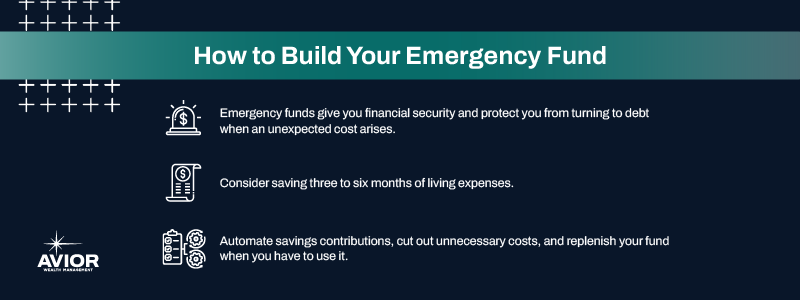How to Build Your Emergency Fund
Learn how to build the right emergency fund that helps you prepare for life’s uncertainties.

No matter how precise your financial planning is, the future will almost always throw a curveball your way. It’s common to face sudden and unexpected expenses through major life transitions and changes, such as the loss of a job, a surprisingly high medical bill, or an expensive house or car repair.
This is where your emergency fund comes into play, your financial safety net that you can fall back on when life inevitably challenges your comfort zone.
Taking the time to save for emergencies now can spell the difference between maintaining your financial stability and falling into unnecessary debt.
That’s why, in this article, we’ll explain why emergency funds are important, how you can build one, and best practices for ensuring its usefulness.
Why Are Emergency Funds Important?
An emergency fund is a savings account set aside to cover unexpected expenses or financial emergencies, protecting your financial stability in the event of a sudden and unplanned expense.
Key benefits of emergency funds include:
- Financial security: Life is full of uncertainties. Without a financial cushion, just one unexpected event can lead to significant stress and financial hardship. An emergency fund gives you peace of mind, knowing that you have the resources to handle whatever comes your way.
- Preventing debt accumulation: Emergency funds can help you avoid accumulating unnecessary debt when something major happens. While many may turn to their credit cards, personal loans, or other forms of high-interest debt, you’ll be able to pull from your emergency fund without rattling your financial stability.
- Meeting your financial goals: Without an emergency fund, an unexpected expense can derail your financial goals, such as saving for retirement, buying a home, or funding your child’s education. By having a dedicated reserve for emergencies, you can protect your long-term financial plans from short-term disruptions.
Consider how an emergency savings account will shield you from both surprises from income losses and surprises from unexpected expenses.
How Much Should You Save?
The next step is to calculate just how much you should have in your emergency fund. The right amount depends on various factors, including your income level, monthly expenses, job stability, and other personal circumstances, such as whether you have dependents.
However, a general rule of thumb is to accumulate three to six months’ worth of living expenses in your emergency fund. If you have a stable job, minimal debt, and no dependents, saving three months may be sufficient. If you have variable income as a freelancer or small business owner, or you have dependents, six months is probably a safer bet.
Some people may try to accumulate more emergency fund savings if they have a higher-cost lifestyle or work in an industry with high job volatility.
Discussing your financial goals with a financial advisor is a great first step toward saving the right amount.
How to Build Your Emergency Fund
Now you’re ready to start accumulating savings. Building emergency savings requires discipline, patience, and a strategic approach.
Here are a few tips to get started.
1. Set a Goal
Begin by calculating your monthly living expenses, including rent or mortgage payments, utilities, groceries, transportation, insurance, debt payments, and entertainment/miscellaneous expenses.
Multiply this amount by the number of months you want your fund to cover. This will give you a clear savings target.
2. Start Small
If the final goal seems daunting, don’t be discouraged. You can always start with a smaller, more achievable target. Break your savings plan up into smaller phases and hold yourself accountable.
This initial amount will vary from person to person, but it should be able to cover minor emergencies while still providing a sense of financial security.
3. Automate Your Contributions
Automating contributions is one of the most effective ways to build your emergency fund.
Set up automatic transfers to a dedicated savings account for each pay period. This ensures consistent progress towards your goal without requiring constant effort on your part.
4. Cut Out Unnecessary Expenses
There’s almost always fat that can be trimmed in our daily budgets.
Redirecting funds from nonessential spending—like dining out, subscription services, or impulse shopping—toward your emergency fund can help you increase your savings.
5. Boost Your Income With a Side Gig
Consider taking on a side hustle or freelance work to generate more monthly income.
Think about how you can use your expertise and experience to provide a service outside of your day job. Dedicate the earnings from these extra efforts directly to your emergency fund to grow it faster.
6. Replenish Your Fund Each Time You Use It
If you have to dip into your emergency fund, whether for an emergency or to pay for a big expense, make it a priority to replenish it as soon as possible.
This ensures that you’re prepared for the next unexpected event without setting yourself back too far.
7. Avoid Nonemergency Withdrawals
It can be tempting to dip into all those savings for vacations or high-end purchases.
However, doing so defeats the purpose of the fund and can leave you vulnerable in the event of a real emergency. Keep your funds strictly for emergencies whenever possible.
Where to Keep Your Emergency Fund
Be strategic about where you place your emergency funds. You have a few options, but make sure that you have easy access to them, no matter which one you select.
A few options to consider include:
- High-yield savings accounts: A high-yield savings account is an ideal place for your emergency fund. It offers easy access while earning interest, helping your savings grow over time.
- Money market account: Money market accounts offer slightly higher interest rates than traditional savings accounts. However, they may require a higher minimum balance.
- Certificate of deposit (CD): A laddered CD strategy can be beneficial if you have a fully funded emergency fund and want to earn a higher interest rate. This involves dividing your fund among several CDs with different maturity dates, ensuring that a portion of your funds is always available while the rest earns more interest.
Avoid high-risk options for emergency savings. Your fund should not be invested in stocks, bonds, or mutual funds, for example.
These assets can fluctuate in value, and you may be forced to sell at a loss if you need cash during a market correction.
Remember that the primary goal of an emergency fund is to provide liquidity and security, not to maximize your returns.
Plan for Life’s Uncertainties With Guidance From Avior
An emergency fund protects you from the financial stress and potential debt that comes with life’s uncertainties, allowing you to focus on your long-term goals.
Set realistic savings goals and stay disciplined to build and sustain your emergency fund.
Our team at Avior is here to answer your questions about emergency funds or other investment strategies. We can guide you through the process of setting up an effective wealth management plan that allows you and your family to live with purpose.
Contact our team today to get started.
Disclaimer: Nothing contained herein should be construed as legal or tax advice. Avior and our Advisors will work with your attorney and/or tax professional to assist with your legal and tax strategies. Please consult your attorney or tax professional with specific legal and/or tax questions. Investment Management and Financial Planner are offered through Avior Wealth Management, LLC, an SEC-registered investment advisor. Past performance is not a guarantee of future results. Investments are subject to loss, including the loss of principal.
No Comments
Sorry, the comment form is closed at this time.




